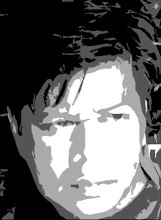Now if you'll forgive me fellating myself for a minute here, I'm something of a jazz connoisseur; you probably gathered that from reading this blog over the last year. I flatter myself as thoroughly grounded with the major points on the timeline, from 1917 and the ODJB on up—and pretty damn familiar with the minor points. But even if I'm not familiar with these records, I know Thurston Moore's work and intellect well enough to know that if he considers them the greatest, then they are massively innovative and epochal works.
So why don't I know these specific albums?
I certainly should have done better research, but I'd also like to pass the buck a bit on this: I think that a large part of the reason I don't know some of the more influential pieces from the avant-garde is because free jazz is treated as though it were a fully separate continuum from the rest of the jazz world. Even the most balanced of critics, like Gary Giddins, treat them this way, with John Coltrane as the single tenuous strand that connects these two islands.
And this, I feel, is wrong.
Partly, of course, I feel this because I think that the jazz universe is incorrect to rank John Coltrane above Ornette Coleman in the jazz pantheon. (Of course, I also think it's incorrect to rank Miles Davis and Duke Ellington above Coleman, and I think I've given pretty solid proof that he ranks below only Armstrong and Parker...but I digress.) Messianic and profound and spiritual a figure as Trane is, he was ultimately consecrating the trail that Ornette had already blazed. But more importantly, it's ridiculous to treat them as two loosely stitched bodies of music. They are, in fact, different regions of the same geography, and they're intermeshed awfully closely.
Anybody who's anybody in jazz had to pay their dues: come up through the ranks of the existing bands and styles. We can't forget that Trane was in Miles's band, can we? For that matter, he also played in Monk's band, and before that was a member of Dizzy Gillespie's big band. Eric Dolphy grew up on West Coast swing and cool jazz with his high-school classmate, Charles Mingus; Archie Shepp's first gig was latin jazz; Lester Bowie aspired to be Louis Armstrong; even Sunny Murray, the great avant-garde drummer, was a onetime employee of Willie "The Lion" Smith, a founding father of stride piano in the 1910s and '20s. One could conclude, and pretty easily I might add, that being a free-jazz player requires a pretty thorough grounding in jazz tradition.
And what about the people who vacillated in between the two "separate" genres pretty easily? Jackie McLean, Wayne Shorter, Freddie Hubbard, Sun Ra? Then there are those like Andrew Hill and Bobby Hutcherson, who made a career out of playing both at once: bop that went in new directions.
So how is it that free jazz survives today, but is walled off by the jazz world? Are we all just listening to that bloated hairball asshole, Stanley Crouch? He insists that free jazz is white America's way of unfairly inserting themselves into a genre that has always been carried by blacks...but if you look at the jazz names I've mentioned here, you might notice that every single one is African American. Or are we just eager to ignore music that demands that we listen hard in order to understand it? I don't know, but I know that I've probably been guiltier of shutting it out than I'd like to believe. I gotta work on that. (Of course, I can still rest on my unending and omnifrustrating Ornette Coleman auditory project for a while....)
Funny, isn't it? Free jazz was the "new thing" when the Civil Rights era was flourishing, and yet it's the music that the jazz establishment subjects to the musical equivalent of Jim Crow.






No comments:
Post a Comment